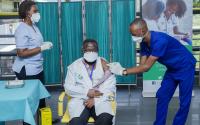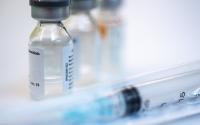[ad_1]
Table of Contents
Seasonal coronavirus antibodies correlate with lower COVID-19 severity
Patients critically ill with COVID-19 infections had significantly lower levels of antibodies against seasonal human coronaviruses (HCoVs) OV43 and HKU1 than those with mild to severe infections, according to a German study published yesterday in the International Journal of Infectious Diseases.
The researchers say the results could indicate that prior infections from seasonal coronaviruses, which frequently present as mild pediatric respiratory tract infections, may help prevent severe COVID-19 illness.
University Hospital of Munster researchers drew serum samples from 60 people with confirmed COVID-19 infections. Participants included outpatients (41.7%), hospitalized patients with severe or moderate disease (26.7%), and hospitalized patients with critical disease (31.7%). Outpatients were selected to match inpatient sex and age as best as possible. The median age of outpatients and those with critical illness was 58 and 55 for inpatients with severe or moderate illness.
Patients with lower levels of HCoV OV43 and HKU1 antibodies (P = 0.016 and 0.023, respectively) were more likely to have longer hospitalization periods. Overall median length of stay was 10 days (range, 2 to 55). Three deaths occurred.
While HCoV OC43 and HKU1 immunoglobulin G (IgG) antibodies were significantly lower in critical COVID-19 patients, these same patients had higher levels of antibodies against COVID-19. Antibodies were classified as non-detectable, below cutoff, with cutoff intensity, above cutoff, and very strong intensity using Mikrogen GmbH’s immunostrip assay recomLine SARS-CoV-2 IgG, which also measures antibodies for HCoV 229E and NL63.
“One might argue that higher levels of antibodies against seasonal coronaviruses are merely a surrogate marker for a more active immune system,” the researchers write. “However, HCoVs OC43 and HKU1 are betacoronaviruses and therefore closer related to SARS-CoV-2 than HCoVs 229E or NL63.”
The researchers suggest that the possible protection HCoV OC43 and HKU1 infers is due to T cell-based immune response, but they say more research is needed in this area.
Feb 22 Int J Infect Dis study
COVID vaccine efficacy is largest predictor of acceptance, survey finds
COVID vaccine efficacy is more influential to vaccine acceptance than minor side effects or serious adverse reaction rates, according to a study published yesterday in the Proceedings of the National Academy of Sciences. While vaccination likelihood increased slightly after the high efficacy announcements of the first COVID-19 vaccines, the researchers say overall attitudes were “largely unchanged.”
The researchers conducted a matched 1,000-person survey in August 2020 and then again in December 2020. Respondents were chosen to represent the US population and randomly assigned to one of nine different groups. Each group reported how likely they would be to receive the COVID-19 vaccine across three different scenarios (27 total) with varying vaccine efficacies, probabilities of minor side effects such as a 24-hour fever, or probabilities of serious reactions such as temporary or permanent paralysis
By using conjoint measurement methods to assess the survey results, the researchers found that the likelihood of the respondent choosing to get vaccinated went up when efficacy was 70% or above. The probability of minor side effects didn’t significantly influence likelihood, and serious adverse reactions only had significant influence when they were a 1 in 100,000 chance as opposed to 1 in 1 million or 1 in 100 million. (For reference, the researchers report that the incidence of anaphylaxis after the first dose of the Pfizer/BioNTech COVID-19 vaccine was 1.1 per 100,000.) Respondents appeared to assess factors independently.
In the December survey, after the announcement of the first COVID-19 vaccine’s 95% efficacy, likelihood increased slightly, from 2.25 (standard deviation [SD], 1.16) to 2.14 (SD, 1.56) on a four-point scale with 1 being “most likely.” However, no significant changes occurred across any of the three main influential factors.
The researchers note that political attitude had a stronger influence on the likelihood of getting vaccinated than statistics on the benefits and risks. For instance, 64% of those who were “very likely” to take the COVID-19 vaccine favored Joe Biden in the election, whereas 27% supported Donald Trump.
Feb 22 Proc Natl Acad Sci study
Nine deer at Minnesota farm had CWD in addition to case in October
After a chronic wasting disease (CWD) infection was reported at a Houston County, Minnesota, white-tailed deer farm in October 2020, the remaining 46 deer were culled Jan 26, revealing nine more cases, according to a Minnesota Board of Animal Health (MBAH) press release yesterday.
CWD is a fatal prion disease spread between cervidae such as deer and elk through contaminated environments, antler velvet, and body fluids and tissues.
Following the herd slaughter, the farm is not allowed to have any deer or elk for 5 years, and the owners must maintain fencing with biohazard signs to notify others and keep wild deer from getting in.
“This herd was in good standing in our farmed cervid program and was double-fenced since 2017,” said MBAH assistant director, Linda Glaser, DVM, in the release. “It’s an example of how elusive CWD can be to detect and control quickly before it infects multiple animals within a herd. Ten infected animals despite an owner following all regulations highlights why we need the research to catch up to the disease.”
An Oct 15, 2020 MBAH news release following the initial case notes that the farm’s location fell within the CWD endemic area in southeastern Minnesota. The release adds that in 2019, 3 deer out of approximately 2,260 tested within 10 miles of the farm were positive for CWD.
Feb 22 MBAH news release
Oct 15, 2020 MBAH news release
Ebola vaccine doses arrive in Guinea after storm delay
Today the World Health Organization (WHO) said Guinea will receive an emergency supply of 11,000 Ebola vaccines after delivery was delayed over the weekend by a dust storm. Vaccination started today.
On Feb 14, after more than 5 years after its last confirmed Ebola infection, Guinea reported new cases of the deadly disease. As of yesterday, the WHO African regional office has confirmed eight cases, including five fatalities, and identified 348 contacts, of which 91% are being closely monitored.
According to the WHO, the vaccination campaign will be launched in Gouecke, a rural community in N’Zerekore prefecture. The vaccines will be deployed in a ring vaccination campaign, in which close contacts are vaccinated first, along with healthcare workers.
“The last time Guinea faced an Ebola outbreak, vaccines were still being developed,” said WHO Director-General Tedros Adhanom Ghebreyesus, PhD. “With the experience and expertise it has built up, combined with safe and effective vaccines, Guinea has the tools and the know-how to respond to this outbreak. WHO is proud to support the government to engage and empower communities, to protect health and other frontline workers, to save lives and provide high-quality care.”
The WHO also said an additional 8,000 doses of vaccine will be delivered in the coming days, for a total of 20,000 doses.
Feb 23 WHO news story
Feb 23 BBC news story
Feb 22 CIDRAP news scan
[ad_2]
Source link












